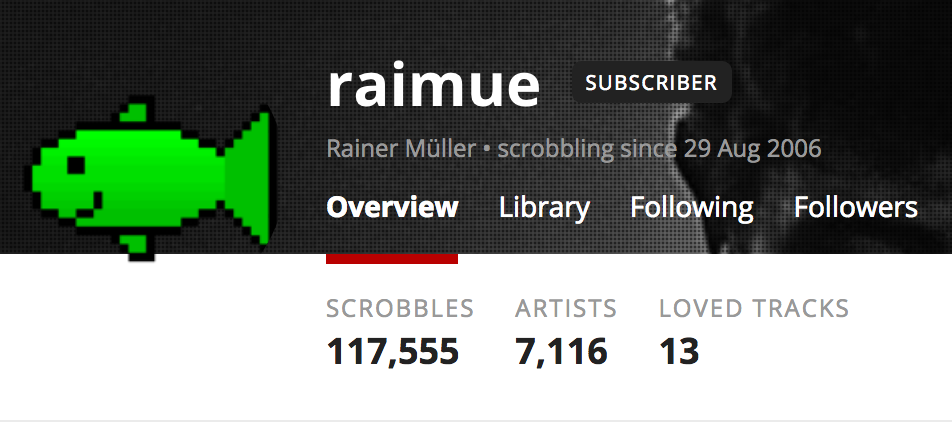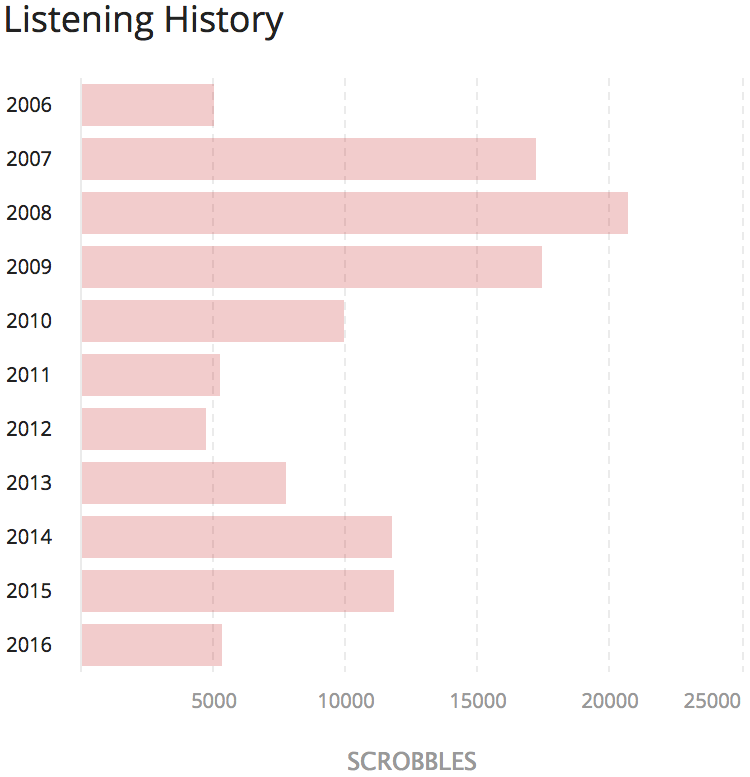Only recently I noticed by chance I have been scrobbling for more than 10 years now. The verb “to scrobble” means submitting the name and artist of songs you are listening to to the last.fm web service, which was originally started as a research project for music recommendations called Audioscrobbler. I joined the site in August 2006 and they have been collecting all the tracks I listened to in their database ever since.

Now after all these years it is really fun for me to dig into the statistics. From the overall amount of scrobbles I can deduce how my musical listening habits have changed over time:

According to these statistics, I was scrobbling much more in the early years. The reason for this would probably be that I spent more time at home during my studies, being able to constantly listen to music on my speakers. The decline in the middle is clearly when I started working more seriously first on my study thesis and then moving on to my diploma thesis. While working in the computer lab at the university I did not have my music collection with me and also at first I did not even own headphones. A little later I bought some, not only to listen to music, but also to avoid distractions and to better concentrate on my work. However, I still did not bring my music collection with me, but instead relied on internet radio and streams. There was never a good integration to scrobble tracks from these. For any last.fm plugin in the common music players, an internet radio stream is just one long, never-ending track – without updated information about artist and song title. Therefore, this period of my listening history will never be part of my last.fm profile. With the advent of Spotify and paying for their service as of 2013, I once again started to scrobble more tracks again. The direct integration of last.fm into Spotify is still great, which also removed the need to run a dedicated application for scrobbling along with the music player.
Overall, I scrobbled 117,556 tracks during this 10 year period, that is an average of 31 tracks per day. Assuming some average track length of about 3 minutes, that means I listen to 1.5 hours of music every day. I listened to 24,027 unique tracks, from 7,118 artists.

My most scrobbled track up to now is Kate Nash – Foundations and I heard it for the very first time on the 13th of May in 2008 at 16:54. Not that this exact date and time would convey any significant information. Although, it is nice to know that last.fm captured this kind of detail long before the quantified self movement and even longer before smartwatches started to track every step you take.
All this information is available to the general public, although last.fm also has options to hide the real-time listening history from your profile. Everything else is available, back to the very start. For every song I ever scrobbled, I get a list with timestamps for each time I listened to this song. I remember the time when I plugged in my iPod every day, synchronizing my music from iTunes, updating all the play counts for all songs I listened to while I was on the go. Even these plays were thoroughly submitted to last.fm, creating a huge collection about me and my musical taste.
There would be quite a potential to find clusters and anomalies in all of this. At which time of day have I been listening most? What kind of music have I been listening to? Would a list of top tracks by play time be different to the currently used play count? Are world-wide events detectable in the scrobbling data? last.fm has an API, but their limits and terms will probably not allow any kind of global analysis. Maybe at some point I will try to re-create what others have done with profiles ([1], [2], [3]) or take a closer look at existing third-party services ([4], [5]).
Especially in the beginning of these 10 years, I listened to a lot of music I obtained through free downloads. Many of them I found on the last.fm website, which still offers this today. That alone exposed me to a lot of alternative and indie artists, many of which I never heard of later again. However, I found some gems that became long time favorites.
In a similar way, last.fm helped to shape my taste in music by giving me recommendations for artists I might like. This is even supposed to be one of the major features of the site, given that was the original goal of the Audioscrobbler research project. However, I never excessively used the social interaction features. I gathered a few followers and I am following a few, but I knew all of them before we connected on the service. And even after that, I never used the messaging feature. In fact, the only messages I received in these 10 years were spam. Artists promoting their work, inviting me to like them, buy something, listening to the whole album after I listened to just one of their tracks.
As last.fm has been such an interesting factor on my music experience in all these years, I eventually decided to support their service by becoming a subscriber last year. Something I would not have been able to afford while I was still a student, when most of my scrobbles took place. I still hope this will help them to extend their service and to reach a wider audience. The focus of the site has shifted quite a bit over the years, but so much has changed since then anyway. Just think about it, 10 years ago MySpace was the most popular website in the world. At this time, the last.fm discovery radio helped a lot with finding new music that matched my personal taste. When last.fm stopped their streaming completely in 2014, this was already ousted by Spotify and then later complemented with their Discover Weekly playlist. The streaming on last.fm was replaced by direct integration with either Youtube or Spotify, directly controlled from the last.fm website. Only after I became a subscriber, I tried out the recommendations playlists a few times. I should remember to do this more often.
I wish last.fm had already ramped up and extended their notification service for local concerts and festivals. Although the listing of events existed for ever on last.fm, this market seems to have been taken over by songkick or Bandsintown. I also have to say that I rarely find interesting concerts on the last.fm events. It seems like the service entirely relies on artists adding their own concerts or other users submitting them manually. That just does not scale, as others like ticket shops already have huge databases of entire artist tours available. last.fm should have partnered with them to get this data.
In these 10 years, last.fm has changed a lot and I am glad the service survived so far, as I would hate to loose all the data gathered over time. I really hope last.fm will last.
